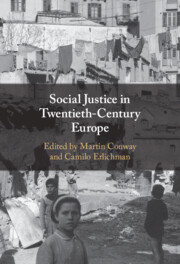Book contents
- Social Justice in Twentieth-Century Europe
- Social Justice in Twentieth-Century Europe
- Copyright page
- Contents
- Contributors
- Acknowledgements
- 1 Social Justice
- 2 Social Justice within a Market Society
- 3 Catholic Conceptions of Social Justice from 1891 to Pope Francis
- 4 Social Justice through Taxation?
- 5 A Fascist Social Justice?
- 6 Social Justice in Authoritarian Central Europe
- 7 Social Justice in a Socialist Society
- 8 Immigrants and Social Justice in Western Europe since the 1960s
- 9 Reimagining Peace through Social Justice in Mid- to Late Twentieth-Century Europe
- 10 Social Justice or Sexual Justice?
- 11 Equity Rules
- 12 Bridging the Void
- 13 Postscript
- Index
10 - Social Justice or Sexual Justice?
Social Justice and the Problem of Women in Twentieth-Century Europe
Published online by Cambridge University Press: 29 February 2024
- Social Justice in Twentieth-Century Europe
- Social Justice in Twentieth-Century Europe
- Copyright page
- Contents
- Contributors
- Acknowledgements
- 1 Social Justice
- 2 Social Justice within a Market Society
- 3 Catholic Conceptions of Social Justice from 1891 to Pope Francis
- 4 Social Justice through Taxation?
- 5 A Fascist Social Justice?
- 6 Social Justice in Authoritarian Central Europe
- 7 Social Justice in a Socialist Society
- 8 Immigrants and Social Justice in Western Europe since the 1960s
- 9 Reimagining Peace through Social Justice in Mid- to Late Twentieth-Century Europe
- 10 Social Justice or Sexual Justice?
- 11 Equity Rules
- 12 Bridging the Void
- 13 Postscript
- Index
Summary
Women have been perceived as a ‘problem’ for visions of social justice since the emergence of the ‘social question’ in the nineteenth century, prompting feminist debates about whether social justice for women is best pursued on the basis of their equality with, or difference from, men. This chapter reconstructs those debates with a focus on Central Europe, the heartland of the late nineteenth-century European socialist and sexual-reform movements and, throughout the twentieth century, the site of conflicts between fascist, state-socialist, and liberal-democratic regimes of social justice. But these conflicts also have a strongly contemporary character, given the deeply gendered experiences of transition to a capitalist economy in the former socialist states of Central Europe since 1989. The absence of an agreed definition of how social justice for women might be achieved (and in which political contexts) was reinforced throughout the twentieth century by the weight of embedded inequalities of gender, which have remained a defining element of Europe’s modern experience. Bringing women into the story of social justice in twentieth-century Europe highlights the perceived deficit of social justice that the editors of this volume identify as the hallmark of contemporary understandings of social justice in Europe today.
Keywords
- Type
- Chapter
- Information
- Social Justice in Twentieth-Century Europe , pp. 205 - 223Publisher: Cambridge University PressPrint publication year: 2024



